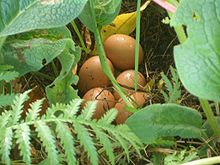- Organic egg production
-
Organic egg production is the production of eggs through organic means. In this process, the poultry are fed organic feed. According to the United States Department of Agriculture, organic means that the laying hens must have access to the outdoors and cannot be raised in cages.[1] Organic egg producers cannot use antibiotics except during an infectious outbreak. Only natural molting can occur within the flock; forced molting is not allowed. Organic certification also requires maintenance of basic animal welfare standards.
Contents
Differences between "Free Range" and "Organic"
Significant differences cover feed, medication, and animal welfare. Organic hens are fed organic feed; it is prohibited to feed animal byproducts or GMO crops - which is not disallowed in free range environments; no antibiotics allowed except in emergencies (in free range, it is up to the farmer, but the same levels of antibiotics as conventional farming is allowed); required animal welfare standards in organic farms, which can improve the quality of both the eggs and the meat - low stress levels lead to superior quality of animal products, a fact long known and used in the production of the famous Wagyu beef[citation needed]. Look for labels that say both "Organic" and "Free-Range". Cage free only means that they are not in a cage, but are usually still confined in barns at high population densities.
Organic feed
Organic feed is grown by certified organic farmers. To become a certified organic farmer, the crop must be free of genetically modified organisms (GMOs). The crop must be free of GMOs and synthetic fertilization for three years before it can be certified for organic usage. If the crop is contaminated by cross-fertilization, the crop is rendered useless for organic grading. Finally, there can be no animal by-products fed to the poultry.
Living conditions
In the United States, "organic" egg production means that the flock may not live in cages and must have access to the outdoors.[1] Organic egg producers in the United States do not always grant meaningful outdoor access to their organic laying hens; most industrial-scale organic egg producers generally build small wood or concrete porches attached to the henhouses, which passes as "outdoor access."[2]
Antibiotics
Organic egg producers cannot feed low-level antibiotics to the poultry. Antibiotics are only allowed during an outbreak of infection or disease.[3]
Molting
Some farms induce molting in their flocks to affect egg production. In organic egg farms, the birds are allowed to go into a natural molt but are not induced.[4]
Animal welfare
Similar to all other forms of egg production in the United States, organic production is also regulated by animal welfare audit system. Mistreatment of the chickens could potentially lead a farmer to losing their organic certification. Thus some of the arguments from animal activist organizations that egg production is cruel and inhumane do not necessarily apply to organic raised hens. On the other hand, male chicks who are born on organic or free-range egg farms are still discarded, by the use of lethal gas, because they do not produce eggs.[5] The American Organic Standards still allow beak trimming as a means to lessen injury to the birds.[6]
See also
- Organic certification
- Free range eggs
- Free range
- Pastured poultry
References
- ^ a b United States Code of Federal Regulations; 7 CFR 205.239 (a)(1)
- ^ Scrambled Eggs: Separating Factory Farm Egg Production from Authentic Organic Agriculture. http://www.cornucopia.org/2010/09/organic-egg-report-and-scorecard/
- ^ http://www.nal.usda.gov/afsic/pubs/ofp/ofp.shtml
- ^ http://greenliving.about.com/od/healthyliving/a/organic_egg_certification.htm
- ^ http://www.goveg.com/organic_eggs.asp
- ^ http://www.upc-online.org/debeaking/ota.html
Further reading
Categories:- Organic farming
- Poultry farming
- Eggs (food)
Wikimedia Foundation. 2010.


